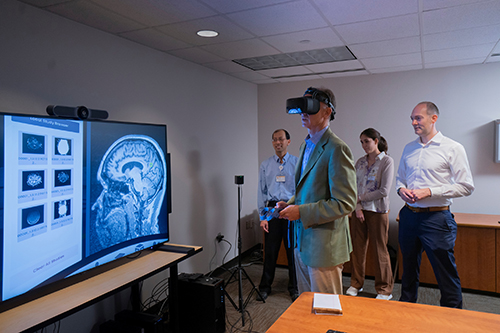 Neuroradiologists at Wake Forest University School of Medicine have begun a pilot study testing the use of virtual reality (VR) systems to remotely read MRIs and other medical images.
Neuroradiologists at Wake Forest University School of Medicine have begun a pilot study testing the use of virtual reality (VR) systems to remotely read MRIs and other medical images.
Jonathan Burdette, M.D., professor of radiology at Wake Forest University School of Medicine, travels periodically to Ecuador to help physicians read radiology studies, because there are few subspecialty-trained neuroradiologists in the South American country.
Many radiologists in the U.S. and Canada offer their time to help colleagues in developing countries, but these consultations are often not ideal due to technology limitations.
Now, through this pilot study, Burdette and his team, including Christopher Whitlow, M.D., Ph.D., chair of radiology, and Josh Tan, diagnostic radiology systems manager at Atrium Health Wake Forest Baptist, are exploring how VR technology may help better serve patients in Ecuador, and beyond.
The hardware for the pilot study was provided by Lenovo and the software was provided by Luxsonic Technologies, designed from the ground up to provide a secure, low cost and easy way for radiologists to connect with their colleagues.
“The wonderful thing about this is that it’s a collaborative environment with people who can look at medical images at the same time, regardless of where they are in the world,” Burdette said. “We are able to interpret images in incredible detail while communicating with the referring clinicians who are seeing the same images in real time, which is just not possible in a traditional reading room in the hospital.”
This collaboration was made possible through Burdette’s connections with Nelson Maldonado, M.D., the founder of QRA Medical Specialty Clinic in Quito, Ecuador. In addition, Karol Cardenas, M.D., who trained at the Universidad San Francisco de Quito and recently began her neuroradiology fellowship at Wake Forest University School of Medicine, will help optimize the educational potential of the VR system with links between the neuroradiology section at Wake Forest Baptist and her residency program in Ecuador.
Given the portability of the system, Burdette and team envision many future possibilities for using this technology, such as remote subspecialty reading of scans throughout the Atrium Health system or having a portable ultrasound unit on an ambulance or helicopter where images could be viewed by multiple people at the hospital in real time while the patient is en route.
“The sky is the limit,” Burdette said. “The educational, clinical and research possibilities in the VR environment are endless. We do not yet know exactly what the future may bring, but this is certainly exciting and is just the tip of the iceberg for what we may be able to do.”
Use of this technology in the collaboration with Ecuador, while challenging, will provide a blueprint for future collaborations around the world.
Burdette is confident that, “if we can do this in Ecuador, we can do this anywhere in the world.”
Media Contact: Joe McCloskey, jmcclosk@wakehealth.edu
